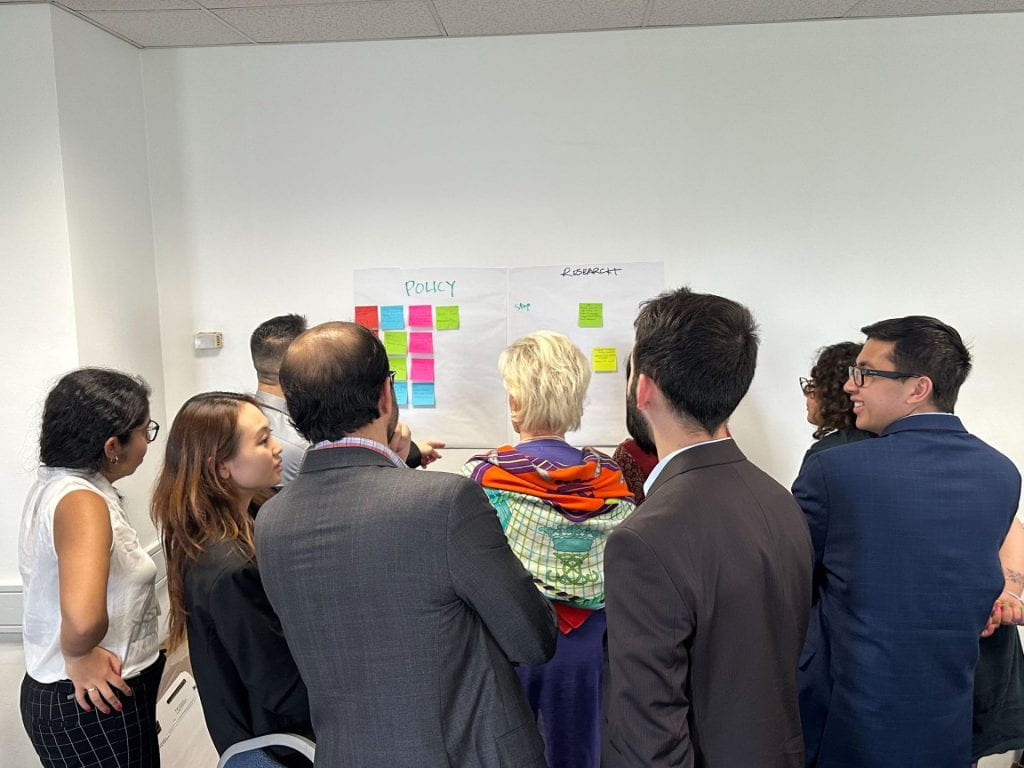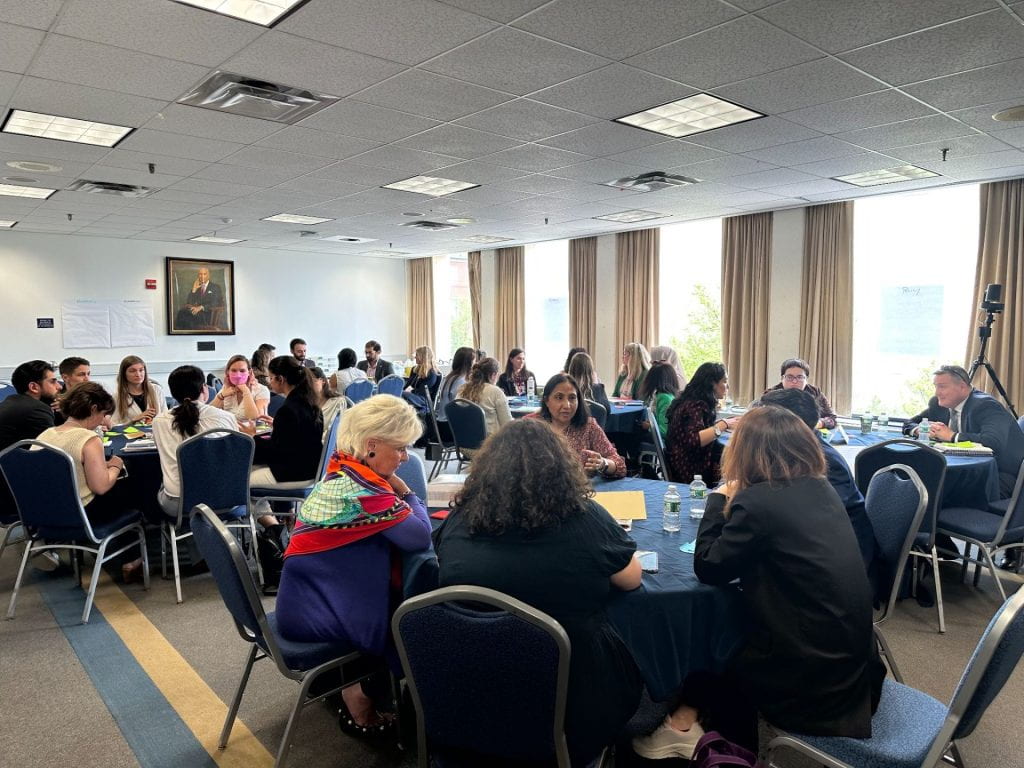By: Jessie Wetherby and Emily Zanieski 6/20/23
Peer reviewed by REAL team members

LINK: GSEHD Conference Provides Afghan Students a Platform to Share Their Stories
In celebration of World Refugee Day (WRD), this blog post reflects on “Afghanistan Policy, Programs, and Research: Centering Student Voices,” a conference held on April 14th, 2023 at The George Washington University (GWU). Co-organized by the Refugee Education Advancement Laboratory (REAL) and the University’s UNESCO Chair in International Education for Development, the conference aimed to bring together students, scholars, policymakers, and practitioners to discuss new perspectives related to displacement and higher education. As this year’s theme for WRD is “Hope Away From Home,” in this post, we aim to highlight the strength, resilience, and hope we learned from our Afghan participants who recently resettled in the United States. This blog also provides context to a new white paper and conference videos (appended below).
LINK: Conference Program and Event Schedule
WATCH: Conference Welcome and Introductions
The first panel included five Afghan students from the American University of Afghanistan (AUAF) who were forced to leave their home institution and their families in 2021, when Kabul fell to the Taliban. During the panel, the Afghan students – previously interviewed during the research process – spoke to audience members about their experiences in Afghanistan, Iraq (where they studied in transit), and the United States (US, where they study now). While all five students spoke highly of their educational experience at AUAF, students also described the subsequent difficulties they faced with the transition to the American University of Iraq, Sulaimani (AUIS) and their respective US universities. Each student spoke about the challenges they had to overcome in adapting to a new culture, language, and, for some, new subject matter. Though they were forced to leave Afghanistan, their determination to continue their educational trajectories persisted at AUIS and now continues in the US. Moreover, despite myriad challenges in displacement, students also highlighted the support received from individuals and organizations that helped to make the path to the US possible. Their discussion highlighted not only their passion and love for Afghanistan but their resilience in pursuing education, despite their circumstances. As such, voices and insights of displaced populations are invaluable as they illuminate gaps in policy and the ways in which governments and organizations can work to adapt their current policies.
WATCH: Opening Panel: Centering Student Voices
The second panel included professionals from the International Rescue Committee (IRC), the US State Department, The Afghan Future Fund, and The Institute of International Education. That panel focused on leveraging student perspectives to change practice for refugees. The panelists underscored the importance of incorporating the feedback from refugee students into their programming to better meet their needs and strengthen their respective organizations’ responses. Additionally, they acknowledged that especially in this complex situation, there is a need to keep student voices at the forefront, as well as to coordinate among agencies working with students. However, as Nadima Sahar, managing director of the Afghan Future Fund, noted, due to the unique nature of the Afghan situation, the “one-size-fits-all approach” in typical scholarship programs is not particularly effective in this case. Students are dealing with the loss of their home, community, and language in addition to adapting to a new culture and environment. She said, “most of the ways we may have dealt with this earlier, may not be applicable here, so those are the nuances that we needed to take into consideration while designing and implementing our programs.” This highlights the need for more regular and systematic incorporation of feedback and cross-coordination among programs. Sara Rowbottom, Senior Technical Advisor for Education and Youth Programs with the IRC, stated this was important, especially when trying to navigate tackling issues and problem solving. This discussion also emphasized the need for funding and a continued effort to center efforts on issues affecting Afghan students and the situation in their home country.
WATCH: Afghan Future Fund: Leveraging Student Perspectives to Change Practice
The next panel, Policy Futures: What’s in Store for Afghans and Afghanistan, included individuals from GWU, the United States Institute of Peace (USIP), The National Journal, and The Office of Refugee Resettlement (ORR). The discussion highlighted the successes of Afghan resettlement in the US, such as the positive effects of public and private resources, new pilot programs, employment opportunities, school enrollment, mental health services, and the role of community-based organizations. Despite the successes, panelists acknowledged that there are still challenges facing resettlement, especially due to the unprecedented influx of refugees in the US. Many are concerned with their longer-term legal status, the cost of living in the US, and the tapering off of governmental support, as well as how to manage the expectations of what the US government can realistically provide in terms of support. Jason Lewis-Barry, Director of Interagency Outreach and Response in the ORR and Chief of Refugee Resettlement Branch, expressed that to support refugee resettlement services, research is needed to study the outcomes of long-term integration and define what successful integration looks like. Additionally, there is a need for programs working with refugees to understand the lived experience of refugees to inform programming. Masih Khybari, Director of Partnerships and Strategy at the National Journal, suggested that to supplement the pressure applied to policy makers, it is also necessary to engage individuals at the local level so that the “tremendous amount of grassroots, civil society-oriented action” which has occurred previously can continue. Belquis Ahmadai, a senior program officer at the USIP, also suggested that the Afghan Diaspora can continue to bring the situation in Afghanistan to the forefront by educating others and acting as ambassadors of Afghan culture.
WATCH: What’s in Store for Afghans and Afghanistan?
The conference concluded with “a call to action”in which students, scholars, policymakers, and practitioners developed action items and opportunities for collaboration amongst those working with displaced populations, especially in the field of education. In doing so, participants were tasked with bridging the gaps between practice-policy, policy-research, and practice-research. Some of the key themes of this workshop included an emphasis on collaboration rather than competition among organizations; contextual understandings; and the need for localized notions of development. One of the Afghan students, Ahmad (pseudonym used to protect participant’s identity), highlighted how prior to the Taliban takeover, Community Development Councils in Afghanistan focused on community-driven development to reach populations that were not served by governmental institutions or the international community. Ahmad’s comment underscores the need for organizations who work with refugee populations domestically and abroad to understand the context and take into account refugee experiences.
Through panel-led discussions and the call-to-action workshop, it became abundantly clear that for too long, the voices of displaced students have seldom been recognized. Instead, it is these voices that should be at the center of research, policy, and practice. As many of the students and policy makers expressed throughout the day, more work is needed to fully incorporate lessons learned from the lived experience of refugees in order to create policy and practice which is truly beneficial and effective. Concluding the day with the “call to action”–which involved Afghan students, policy makers, and academics–was important, because it reminded all participants that our discussions should continue beyond the conference to continue empowering and centering displaced students’ voices.
The conference was sponsored by the Hollings Center for International Dialogue and the Friends of the American University of Afghanistan. It was co-organized by the International Education Program at The George Washington University’s Graduate School of Education and Human Development in close collaboration with GW UNESCO Chair in International Education for Development and Refugee Education Advancement Lab. In conjunction with the conference, graduate students and faculty from George Washington University interviewed 5 Afghan students and wrote a white paper on displacement and higher education as it pertains to the students’ lived experiences, in hopes of informing better practice, policy, and research. The links to the relevant resources can be found below:
Relevant Resources: Endale, B. (April 19, 2023). GSEHD Conference Provides Afghan Students a Platform to Share Their Stories. GW Today. Retrieved from https://gwtoday.gwu.edu/gsehd-conference-provides-afghan-students-platform-share-their-stories

